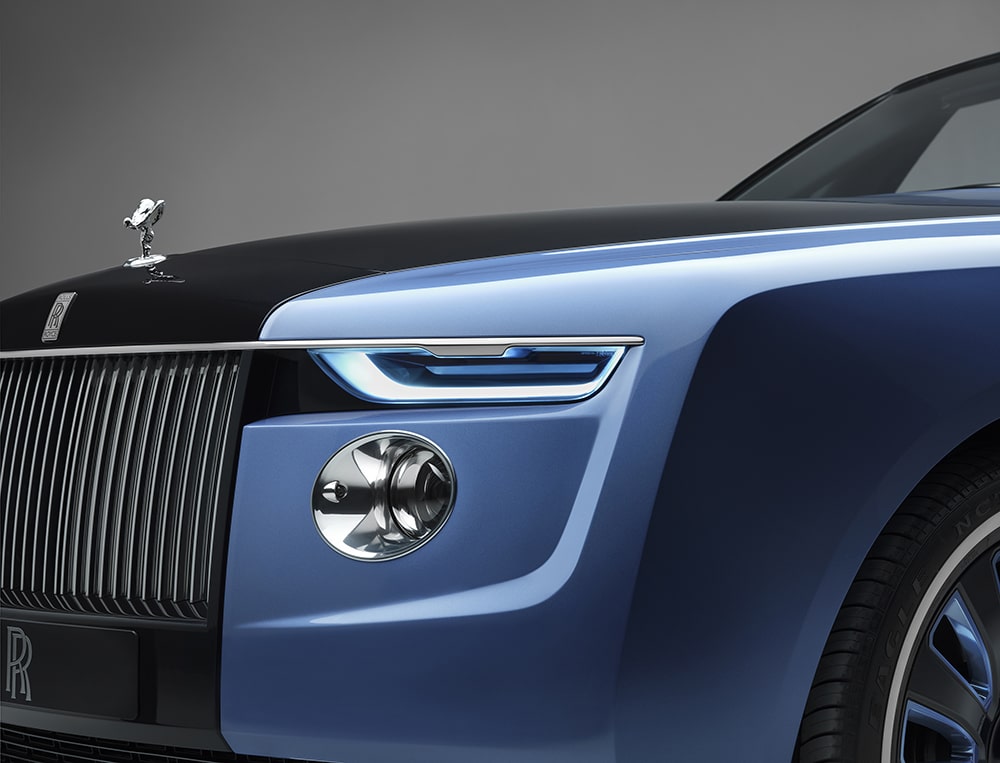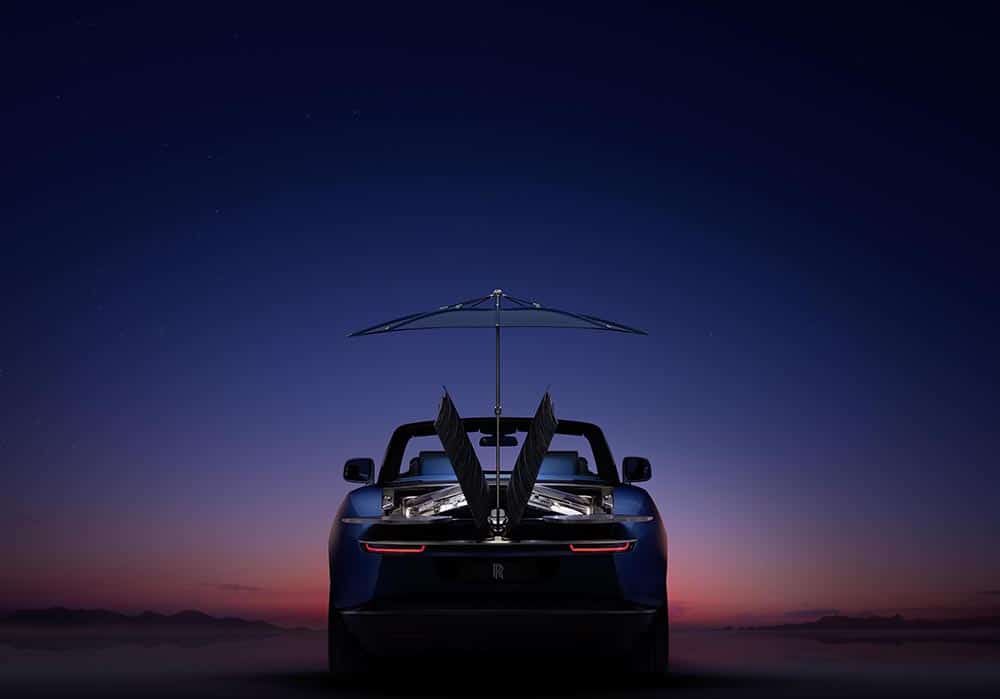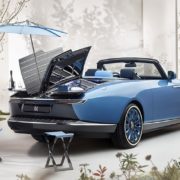ROLLS-ROYCE ‘BOAT TAIL’. A COUNTERPOINT TO INDUSTRIALISED LUXURY.
Today marks a seminal moment for the House of Rolls-Royce. We are proud to unveil Rolls-Royce Boat Tail to the world, and with it, the confirmation of coachbuilding as a permanent fixture within our future portfolio.
- Rolls-Royce introduces utterly unique coachbuilt ‘Boat Tail’ commission
- Rolls-Royce Coachbuild to become a permanent fixture in future portfolio
- Based on a true commission model, ‘Boat Tail’ represents a collaborative exploration of luxury, design and culture between the marque and commissioning clients
- Coachbuild empowers clients to create potent evocative expressions of personal taste
- Rolls-Royce Coachbuild is contemporary patronage in its truest form
- Rolls-Royce prompted the contemporary coachbuilding movement in 2017 with the introduction of ‘Sweptail’
“Today marks a seminal moment for the House of Rolls-Royce. We are proud to unveil Rolls-Royce Boat Tail to the world, and with it, the confirmation of coachbuilding as a permanent fixture within our future portfolio.
“Historically, coachbuilding had been an integral part of the Rolls-Royce story. In the contemporary Rolls-Royce narrative, it has informed our guiding philosophy of Bespoke. But it is so much more. Rolls-Royce Coachbuild is a return to the very roots of our brand. It represents an opportunity for the select few to participate in the creation of utterly unique and truly personal commissions of future historical significance.

“Rolls-Royce has carefully listened to its closest clients, each of whom has expressed a desire to deepen their relationship with the brand by creating ambitious, personal statements of true luxury. Rolls-Royce Boat Tail is not a concept created to be retrospectively sold.
“Quite the contrary. Rolls-Royce believes in complete authenticity and Boat Tail is the culmination of a four-year collaboration with three of our most special clients.
“Rolls-Royce Coachbuild clients are intimately and personally involved at each step of the creative and engineering process. We work in harmony with the client to gain complete fluency in the nuances of their character and personality. We carefully translate these qualities into the elements with which they wish to imbue their commission.
“Only the House of Rolls-Royce can offer its Coachbuild clients the inimitable opportunity to commission a product of future historical significance, that is as fundamentally unique as they are – and then participate in every detail of its creation.
“This is authentic luxury. This is contemporary patronage in its truest form. This is Rolls-Royce Coachbuild.”
Torsten Müller-Ötvös, Chief Executive, Rolls-Royce
“Rolls-Royce Boat Tail challenges the notion of what a motor car is and creates a new definition of what a motor car means. Boat Tail exists far beyond a mere means of transport. It is not just the method to reach a destination, but the destination itself. It is an ambition realised with a remarkable cohort of women and men who empowered the marque to create a concept of extraordinary scope.

“Coachbuild provides freedom to move beyond the usual constraints. Normally, there is a natural ceiling to Rolls-Royce Bespoke by way of the canvas. At Rolls-Royce Coachbuild we break through that ceiling, embracing the freedom of expression afforded by coachbuilding to shape a concept directly with our commissioning patrons.
“With Boat Tail we have achieved this. We have created a trio of exceptional cars which, although they share a common body style, are each imbued with the unique, highly personal imprint of the commissioning patron, thereby telling differing stories. Boat Tail is unprecedented. Boat Tail is a distinct counterpoint to industrialised luxury.”

Alex Innes, Head of Rolls-Royce Coachbuild Design, Rolls-Royce
As a House of Luxury, Rolls-Royce imbues its products with meaning. A Rolls-Royce serves as a canvas onto which clients reflect their personal tastes, express ambitions and often, define legacies. The Bespoke treatment of a Rolls-Royce elegantly reflects its status as ‘the best car in the world’ while stylishly expressing the personality of its commissioning client.
Ever increasingly, clients appreciate and enjoy the marque’s Bespoke capabilities and Rolls-Royce is called upon, by its clients, to integrate itself into their lives in meaningful ways. The brand and its clients have become progressively closer and the designers, engineers and craftspeople at the Home of Rolls-Royce, a Global Centre of Luxury Manufacturing Excellence, have developed a unique fluency in interpreting the lifestyles of these remarkable women and men. This evolution of mutual confidence has resulted in ever more ambitious commissions, reaching well beyond the scope of Bespoke competencies and capacity, into the rarefied realm of coachbuilding. To fulfil these extraordinary client commissions Rolls-Royce has reached a decision to return to one of the historical roots of the marque and to initiate a distinct department within the company, Rolls-Royce Coachbuild.
Coachbuilding is a highly distilled expression of Rolls-Royce Bespoke and is reserved for those who look to move beyond existing constraints. It is based on a true commission model and represents a collaborative exploration of meaningful luxury, design and culture between the marque and its commissioning client. The results become pivotal moments in time that create a future historical legacy, advancing designs which in turn define an era, extending influence far beyond the original intended purpose of a mere means of transportation.
Rolls-Royce Coachbuild is contemporary patronage in its truest form.
The discipline inherent in Rolls-Royce’s approach to coachbuilding requires elite artistic skills that do not exist elsewhere in the automotive industry. Commissioning clients demand an object that is truly transformative; an object that makes a permanent statement and sets itself apart from anything that has gone before.
In response, the marque must interrogate and deeply understand two worlds. The first is the intimately personal context of the client – their individual life-space, how they celebrate, what and who they surround themselves with, and the experiences that have defined the very best moments in these exceptional people’s lives. The second is the broader cultural context in which a Coachbuild car will exist. Here the marque explores the cultural nuances of the client, movements in architecture, couture, colour palettes, artistic tastes – even hospitality.

THE DAWN OF A MOVEMENT
In 2017, the celebrated Rolls-Royce Sweptail defined the dawn of the contemporary coachbuilding movement. It created a definitive moment that raised the awareness of a new watermark in luxury and automotive possibility, illustrating a new realm of exploitation owing to its hand-built nature. This remarkable product, which was instantly proclaimed as one of the finest intercontinental tourers in history, represented a major recalibration of possibility, and confirmed that the legacy of Rolls-Royce will be defined in collaboration with its clients.
Sweptail set a new waterline of potential and ignited a fascination among a rarefied cohort: collectors, patrons of the arts and commissioning clients of now-iconic architecture. A number of these women and men approached Rolls-Royce to discover if they too could collaborate on a unique commission, one that was even more profound – one that provided an elevated sense of curation. The marque agreed, signalling the genesis of a permanent contemporary Coachbuild department at the Home of Rolls-Royce.
Within this group, it emerged that three potential patrons shared a deep appreciation of contemporary nautical design. J-Class yachts were often referenced as points of inspiration, both for their purity of form and their requirement for hand craftsmanship at the highest level to will them into existence.
This client-led creative expression coincided with a long-held ambition of the design team at Rolls-Royce to create a contemporary expression of the Boat Tail typology, where coachbuilders would graft the hull forms of sailing boats onto the rolling chassis of a Rolls-Royce. When the idea of this design direction was proposed, the three patrons were unequivocal in their approval. And all three shared a single demand: “Show me something that I have never seen before.”
In consultation with the clients concerned, an agreement was reached whereby three cars would share a common body, but each would then be individually, highly personalised, reflecting the confluence between vision, capability and ambition of the marque and each of the individual commissioning patrons.
Rolls-Royce Boat Tail was conceived.

THE TRANSFERENCE OF SOUL
The manual techniques of coachbuilding offer new realms of design opportunity. Once the preliminary design proposal is penned by hand, the discovery of the form is enabled with a full-sized sculpture in clay, allowing hand-crafted manipulation of the expansive surfaces to perfect its shape. Throughout this process, the clients were invited to envisage the scope of the collaboration and influence its direction. Cutting-edge engineering technologies within Rolls-Royce are fused with the artistic practice of coachbuilding to exploit new possibilities. The clay sculpture is digitally remastered, from which the buck, is created on to which aluminium sheets are hammer-formed by hand.
Employing age-old individual hand skills and craft, a living canvas is created from metal –honing and optimising the aluminium body, creating a clarity of surface and continuation of line that is unable to be achieved by machine alone.
The process is akin to yacht building, easing the transference of soul into the creation. A process of hand refinement is repeated almost endlessly, without the pressure of time. Slowly, vast sheets of metal transform into the sculptural representation of Boat Tail. A truly pure form is created: uninterrupted by panel breaks, dramatic in its curvature, monolithic in scale and formed from one seemingly endless surface.

A CELEBRATION OF SUCCESS
The first Rolls-Royce Boat Tail, unveiled today, is a curation of exceptional thoughts, concepts and items, which culminate to form the clients’ perfect experience. The commissioning patrons, a globally successful couple who are highly proficient in the appointment of Rolls-Royces, truly personify connoisseurship; their luxury curation is an artform in itself. Their proposition was purposefully self-indulgent. Their desire was to create a response to a life of hard work, success achieved, and celebration required. Their Rolls-Royce Boat Tail should be joyful, a celebratory car to enjoy with their family.
Together, with the marque’s designers, they embarked on an intellectual journey, founded on a long-standing and creative relationship with the brand. Indeed, the clients’ fascination of the Boat Tail form was furthered by a motor car in their private collection; a 1932 Rolls-Royce Boat Tail, lovingly restored, by them, in time for their modern Boat Tail’s completion.
Rolls-Royce Boat Tail presents a wonderful new aesthetic for the marque, balancing previously unseen levels of sculpture with discrete, sometimes playful functionality. The creation tells the romantic tale of Rolls-Royce’s history, echoing a Boat Tail design but not explicitly mimicking it, fusing an historical body type with a thoroughly contemporary design.
At nearly 5.8m long, its generosity of proportion and clarity of surface present a graceful and relaxed stance. The front profile is centred on a new treatment of Rolls-Royce’s iconic pantheon grille and lights. The grille becomes an integral part of the front end, not an applique; a freedom of design bestowed only upon models within the Coachbuild portfolio. This progressive treatment softens Rolls-Royce’s familiar formality while retaining the marque’s undeniable presence. A strong horizontal graphic with deep-set daytime running lights forms Boat Tail’s intense brow line and frames classical round headlamps, a design feature recalled from the design archives of Rolls-Royce.
In profile, nautical references are very suggestive. The wrap-around windscreen recalls the visor on motor launches, while the gentle rearward lean of the A-pillar, the large, crisp volumes at the front and the tapered rear create a gesture that recalls a motor launch rising out of water under power. A progressive negative sculpture in the lower bodyside creates a lithe impression, while making an historical reference to the running boards of prominent heritage Rolls-Royce designs.
Viewed from dead rear, the body resolves in a gentle sharpening of the form. As with the front, a horizontal emphasis is established at the rear with wide, deep-set lamps – a break from the expected vertical Rolls-Royce lamp iconography.
Indeed, it is at the rear where the nautical references become more apparent. The aft deck, a modern interpretation of the wooden rear decks of historical Boat Tails, incorporates large swathes of wood. Caleidolegno veneer is applied in a feat of Rolls-Royce engineering; the grey and black material which is typically housed in the interior, has been specially adapted to be used on the exterior, with no compromise to the aesthetic.
The open pore material features a linear wood grain which is visually elongated by brushed stainless steel pinstripe inlays, serving as an optical nod to the typical wooden construction of yachts – both old and new. The honed skills of Rolls-Royce’s wood specialists have manipulated and book-matched the grain so as to contract with the geometry of the car. The veneer treatment extends to the lower transom area resolving the taper and overall volume astern. This bold truncation is a subtle reference to the hull lines of classic Boat Tail bodies.
From the rear, one perceives a strong graphical composition marked by further horizontal emphasis, accentuating Boat Tail’s great width. Deep-set lamps establish a dramatically low reference point, evoking the dipped stern and proud bow of a motor launch under power and on plane.
An explicit architectural influence is discovered in Boat Tail’s unconventional fixed-canopy roof. Adding to the sculptural form, the sweeping roofline concludes in delicate structural elements that touch down on the rear, redolent of flying buttresses. Of course, if inclement weather is encountered while the roof is removed, a temporary tonneau is stowed for static transitory shelter.

A MUSE IN BLUE
The exterior of Rolls-Royce Boat Tail is swathed in a rich and complex tone of the client’s favourite colour – blue. The hue, with an overt nautical connotation, is subtle when in shadows but in sunlight, embedded metallic and crystal flakes bring a vibrant and energetic aura to the finish. To ensure the smoothest possible application when rendering the exterior, a finger was run over the definitive body line before the paint had fully dried to soften its edges. The wheels are finished in bright blue, highly polished and clear coated to add to Boat Tail’s celebratory character.
A hand-painted, gradated bonnet, a first for Rolls-Royce, rises from a comparatively subdued deeper blue which cascades onto the grille, providing a progressive but informal aesthetic and a solidity of overall volume when viewed from the front.
The interior leather reflects the bonnet’s colour tone transition with the front seats swathed in the darker blue hue, recognising Boat Tail’s driver focused intent, while the rear seats are finished in the lighter tone. A soft metallic sheen is applied to the leather to accentuate its pairing with the painted exterior while detailed stitching and piping is applied in a more intense blue inspired by the hands of the car’s timepieces. A brilliant blue is also found woven at a 55 degree angle into the technical fibre elements to be seen on the lower bodywork, precisely orientated to emulate the spill of a water’s wake.
The fascia is distilled in its appearance, purposefully reduced to provide a modern aesthetic. This minimalist canvas accentuates the jewel like features of the completely unique BOVET 1822 timepieces specifically commissioned by the client for Boat Tail (see below). Collecting pens is another of the clients’ great passions. A particularly cherished Montblanc pen will reside in a discretely placed, hand-crafted, case of aluminium and leather, in Boat Tail’s glove box.
The instrument panel dials are adorned with a decorative technique named Guilloché, more commonly perfected in the workshops of fine jewellers and watchmakers. An elegant, thin rimmed two-tone steering wheel then bears the colours of the commission.
The tactility of the open pore Caleidolegno is brought into the cabin. Anthracite in colour, the veneer brings modern strength and depth to offset the softness of the light blue and metallic sheen. The wood is applied to the lower cabin and floor area, reminiscent of wooden hull forms, again, at 55 degrees, perfectly book matched on centre line providing a uniform appearance when viewed from either side.

A SENSE OF OCCASION
“This car should mark a sense of occasion and serve that occasion like nothing else”.
Such was the brief of Rolls-Royce Boat Tail’s commissioning patrons. In response and in reflection of their character, the rear deck inconspicuously houses a highly ambitious concept never seen before in the automotive world. At the press of a button, the deck opens in a sweeping butterfly gesture, to reveal an intricate and generous hosting suite. Its complex movement was inspired by cantilever concepts explored by renowned architect Santiago Calatrava.
The hosting suite creates a celebratory focal point for a shared occasion and affords ample opportunity to reveal the individuality of the clients’ tastes and desires. It harbours an abundance of surprises executed to the highest quality. Expressed in a celebratory fashion, subverting the very notion of the motor car, the hosting suite surprises and delights all who come to experience it.
Hinged towards the centre line, the synchronised balletic opening movement reveals a treasure chest of moving parts that offer themselves to the host at a precise angle of 15 degrees. This subtle gesture of presentation reflects a genteel and quintessentially British expression of service.
The chest is appointed with the perfect accoutrements for a true Rolls-Royce al fresco dining experience; one side dedicated to aperitifs, the other, cuisine, complete with cutlery engraved with the name ‘Boat Tail’, made by Christofle in Paris.
A double refrigerator has been developed to house the clients’ favourite vintages of Armand de Brignac champagne. Elegant cradles were created to stow the specific bottle size within the refrigerator, the surrounds are highly polished and colour matched to the bottle.
While champagne is a familiar trope in the luxury world, Boat Tail’s client had a particular affinity with fine wine. The husband of this couple recalled a story from his humble beginnings. A great friend of his was a sommelier in his hometown and educated him in the taste profiles of various Grandes Marques de Champagne. This became a life-long education that turned into one of the most informed collections of rare Grand Cru champagnes in the world. The requirement for this knowledge and passion to be shared through the client’s Boat Tail was paramount – as was the need for this champagne to be rapid-cooled to precisely six degrees – the optimum serving temperature of the preferred vintage.
A classic design element of contemporary Rolls-Royce motor cars is the stowage of Rolls-Royce umbrellas in the doors, in anticipation of possible poor weather. In a delightful twist and to heighten the languid experience of Boat Tail, a unique parasol is housed beneath the rear centre line in anticipation of fine weather. A telescopic movement opens this beautiful and whimsical canopy inversely, ensuring effortless deployment.
Cocktail tables, which elegantly rotate to mimic the offering of an attendant, open on either side of the hosting suite providing access to two highly contemporary minimalist stools, which are discretely stowed below. Designed by Rolls-Royce and created by Italian furniture maker Promemoria, the slim-line interlocking stools are formed from the same technical fibre found on the exterior of the car. The interior blue Rolls-Royce leather provides the stools’ suitably comfortable seating materials.

TIMELESS PASSION – A COLLABORATION WITH BOVET 1822
In a move that further demonstrates the clients’ visionary approach to contemporary patronage, two great luxury Houses with a common pursuit of perfection have been brought together at the clients’ behest. World-class craftspeople from the House of BOVET 1822, which was founded on the philosophy of ingenuity and engineering, were called upon to work hand-in-hand with Rolls-Royce’s own masters in their field.
The mechanically minded clients sought to break new ground in horology. As esteemed and passionate collectors of both the Swiss-based House of BOVET and Rolls-Royce, their vision was to create exquisite, ground-breaking timepieces for their Boat Tail. In an act of tireless endeavour and genuine collaboration, the Houses have come together to re-imagine Rolls-Royce’s iconic centrepiece, the dashboard clock.
The result is an accomplishment never before realised in either industry. Two fine reversable timepieces, one for the lady and one for the gentleman, have been designed to be worn on the wrist, or, placed front and centre within Boat Tail’s fascia as the motor car’s clock.
The two-sided timepieces required Rolls-Royce and BOVET 1822 to work side by side over the course of three years to develop a ground-up remastering of the Amadeo convertible system, the most complex undertaken to date. The result is a true reflection of BOVET’s mastery, allowing for the bespoke tourbillon timepieces’ inclusion in the motor car.
Pascal Raffy, owner, BOVET 1822, commented, “I am so proud of the BOVET 1822 team, who worked in tandem with the elite design team at Rolls-Royce to produce something spectacular. These two pieces, and the mounting system, are completely unique and unlike anything we have ever done before.”
The story behind the creation of these remarkable works of art, and a detailed exploration of their mechanisms, together with information on the precious materials, unique micro-sculptures and the vast complexity of the watch carrier will be shared via a press release on 8 June, 2021 at 1pm BST.

AN ENGINEERING MARVEL
To fulfil the clients’ extraordinary ambitions, significant engineering challenges were overcome in the development of Rolls-Royce Boat Tail. Indeed, 1813 completely new parts were created specifically for the cars. Time, patience, dedication and passion were the project’s hallmarks. To complete the preliminary engineering phase, prior to the commencement of production, a total of over 20 collective years were expended.
While designs were being finalised with the clients, the marque’s body-in-white, with its scalable aluminium spaceframe architecture, was completely reconfigured to support Boat Tail’s generous proportions, a process that took eight months in itself. As ever, the 15-speaker Bespoke Rolls-Royce Audio System was intended from the motor car’s inception, but the spaceframe architecture was exploited differently. Rolls-Royce’s existing product portfolio use a specially designed sill section of the architecture as the resonance chambers for the sound system’s bass speakers. In Boat Tail, the entire floor structure is utilised, creating an exceptional audio experience for the client.
To support the complex requirements of the hosting suite to the rear of Boat Tail, a unique electronic treatment was required. Five electronic control units (ECUs) were created for the rear of the car alone – a process that required a completely redesigned, dedicated wiring harness, which was the product of nine months of intensive research and development. Only then was it possible for the aft deck lids to open to an appropriate 67-degree angle, incorporate a highly secure locking mechanism and integrate a total climate control system to the rear hosting suite to preserve any cuisine stowed on board.
Indeed, the inside temperature of the hosting suite was a specific consideration. Boat Tail was created in anticipation of fair weather, so measures needed to be taken to ensure that heat absorption did not adversely affect the contents of the suite, which could include food, liquids and of course champagne. To that end, two fans are mounted in the lower section of the hosting suite to dissipate heat. To confirm this and to ensure that Boat Tail’s hosting suite will acquit itself in all climates, it has been rigorously and successfully tested to 80 degrees Celsius and -20 degrees Celsius.
As Boat Tail is a fully homologated, road-legal motor car that was created to be driven, it was only fully released by the marque once it had undergone the same rigorous dynamic testing as all other Rolls-Royces, including high speed analysis to ensure the contents of the rear hosting suite are sufficiently fastened and therefore silent under power. Indeed, each client has stipulated that they wish to drive their Boat Tail immediately upon receipt.
Torsten Müller-Ötvös, concluded, “Boat Tail is the culmination of collaboration, ambition, endeavour, and time. It was born from a desire to celebrate success and create a lasting legacy. In its remarkable realisation, Rolls-Royce Boat Tail forges a pivotal moment in our marque’s history and in the contemporary luxury landscape.”


